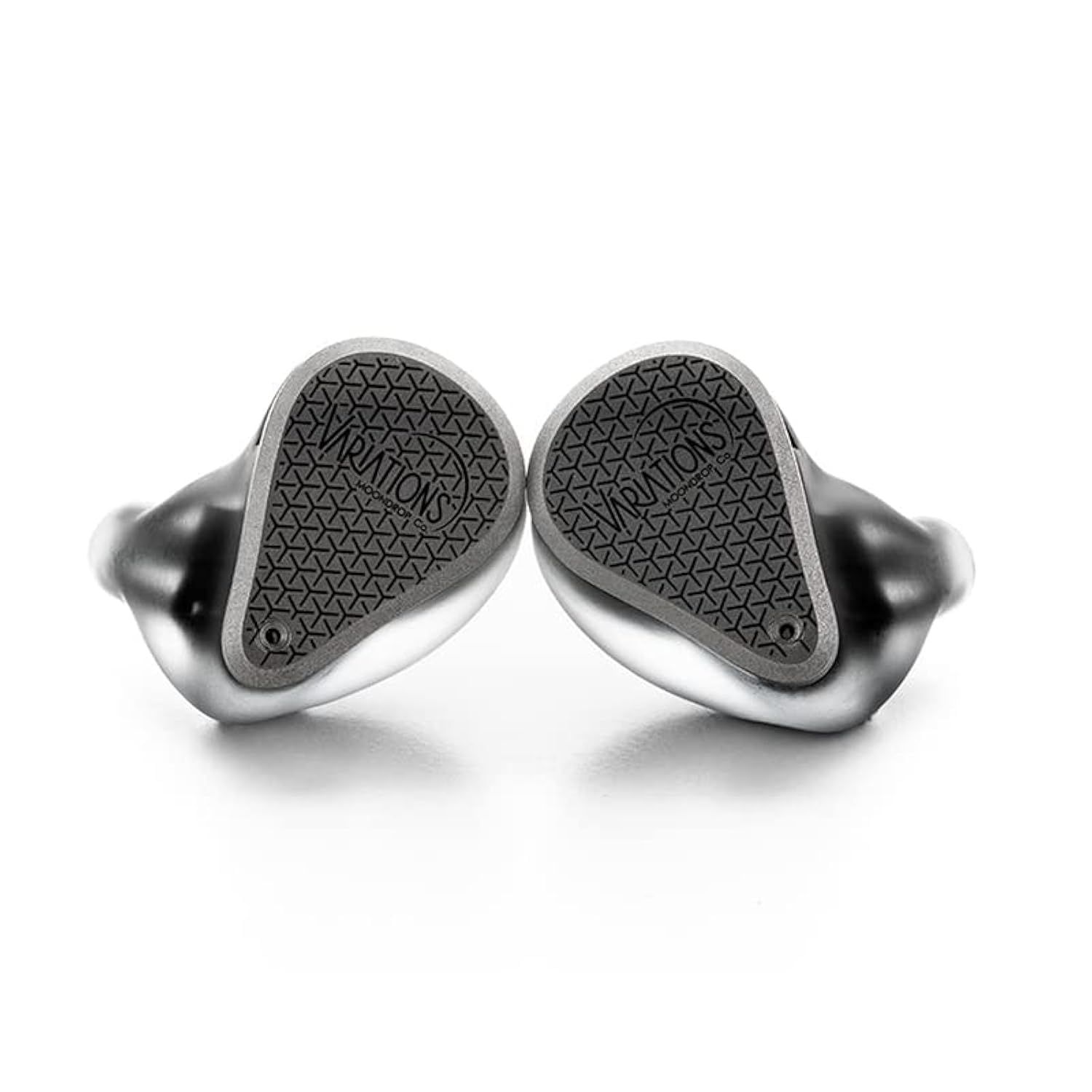Daybreakvs.Variations
Sound & Specs Comparison
Information
Both IEMs are widely regarded in the audiophile community. See how they differ in terms of sub-bass response, upper mids, clarity, and overall tonality. Spider charts and rating breakdowns included.
Objective Comparison
Facts, details, stuff.
| General Info | Daybreak | Variations |
|---|---|---|
| Brand | CrinEar | Moondrop |
| Country | – | China |
| IEM Description | – | Moondrop Variations is a hybrid in-ear monitor combining electrostatic, balanced armature, and dynamic drivers for a precise and immersive listening experience. Known for its balanced, reference-style tuning with tight bass, clean mids, and extended treble, it’s a favorite among audiophiles who crave clarity and technical performance. Ideal for detail lovers and those seeking a high-fidelity sound signature. |
| Price Level | 100 – 500 | 500 – 1.000 |
| Housing & Driver | ||
|---|---|---|
| Driver Config | – | Tribrid |
| Driver Types | – | Dynamic Driver + Balanced Armature + Electrostatic |
| Shell Material | Fully Filled Resin, Aluminium Nozzle | Copper |
| Cable | – | – |
| Technical | ||
|---|---|---|
| Freq Range | – | 9-40,000 Hz |
| Impedance (Ω) | – | – |
| Sensitivity (dB) | – | – |
| Crossover | – | – |
| Platform Info | ||
|---|---|---|
| Comments | 0 | 1 |
| Visit Count | 133 | 69 |
| External Reviews | 0 | 3 |
Meta Ratings
For comfort fit, Variations performs softly better (7 vs 6.5). While Variations is passable in its design, Daybreak stands barely above, particularly in terms of assembly quality, material choice, and finish.
| Daybreak | Variations | |
|---|---|---|
| Sound | 6.5 | 6.5 |
| Comfort Fit | 6.5 | 7.0 |
| Build Quality | 7.0 | 6.5 |
| Stock Cable | – | 5.5 |
| Accessories | 6.0 | 6.0 |
Sound Characteristics
Variations produces sub-bass that is a more textured and present in cinematic or bass-heavy tracks (6.5 vs 5.5). The low-end on It is a more controlled and rhythmic, offering better definition than Daybreak (6.5 vs 6). It adds a more body and slam to bass hits, which makes it feel more physical than Daybreak (8.5 vs 6). It renders lower mids a more naturally, giving male vocals and instruments a fuller tone than Daybreak (7.5 vs 6). It reproduces female vocals and strings with m more air and forwardness, while Daybreak remains recessed (8 vs 6.5). Instruments like violins and brass are portrayed with a more brilliance on It, while Daybreak sounds slightly dull (7.5 vs 6.5). The upper treble of It extends a further, offering more sparkle and openness than Daybreak (8 vs 7). It paints a m broader sonic landscape, offering better instrument positioning across the stage (7.5 vs 6). It extracts low-level details s more effectively, helping subtle nuances emerge clearer than on Daybreak (8 vs 6). It organizes musical elements a better across depth, enhancing spatial realism over Daybreak (7 vs 6.5). It shows b better control of masking effects, maintaining clarity across frequency ranges better than Daybreak (7 vs 6.5). Notes played through It feel a weightier and fuller, giving a more satisfying impact than those from Daybreak (8 vs 6). It delivers dynamic shifts with c greater impact, making Daybreak sound comparatively tame (8.5 vs 5.5). Listeners may experience a fewer sharp edges in 'S' and 'T' sounds with It, whereas Daybreak can get fatiguing (9 vs 6). It renders timbres with m better harmonic balance, preserving the character of instruments more accurately than Daybreak (7.5 vs 5). Across the frequency range, It stays m more consistent in tonal balance, resulting in a smoother listen than Daybreak (7 vs 5.5). The grain and surface of instruments are rendered a more vividly by It, while Daybreak feels flatter (7.5 vs 5).
| Daybreak | Variations | |
|---|---|---|
| Sub Bass | 5.5 | 6.5 |
| Bass | 6.0 | 6.5 |
| Bass Feel | 6.0 | 8.5 |
| Lower Mids | 6.0 | 7.5 |
| Upper Mids | 6.5 | 8.0 |
| Lower Treble | 6.5 | 7.5 |
| Upper Treble | 7.0 | 8.0 |
| Sound Stage Width | 6.0 | 7.5 |
| Detail | 6.0 | 8.0 |
| Layering | 6.5 | 7.0 |
| Masking | 6.5 | 7.0 |
| Note Weight | 6.0 | 8.0 |
| Slam | 5.5 | 8.5 |
| Sibilance | 6.0 | 9.0 |
| Timbre Color | 5.0 | 7.5 |
| Tonality | 5.5 | 7.0 |
| Texture | 5.0 | 7.5 |
Tonal Signature
// Nothing to compare yet.

